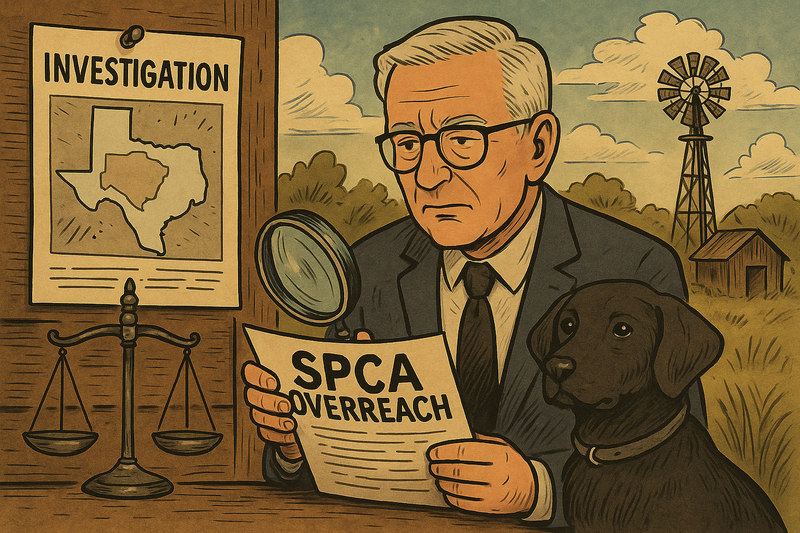WHEN ANIMAL WELFARE GOES TOO FAR?
An Investigative Look Into Allegations of SPCA Overreach in Rural Texas**
By: Craig R. Hanna- United K9 Magazine
Investigator BL Cozad
Across Texas, animal welfare organizations often stand at the front lines of rescuing neglected and abused animals. But in several rural counties, concerns are growing that some enforcement actions—intended to protect animals—may instead be causing unintended harm to the very communities they serve.
Recently, a private investigator submitted a detailed report to United K9 Magazine outlining a series of serious allegations regarding SPCA-related operations in Hunt County and Van Zandt County, Texas. These allegations, which remain unproven in a court of law, center on claims of improper seizures, due process violations, and questionable partnerships between nonprofit animal organizations and local officials.
United K9 Magazine has reviewed the information and spoken with several sources as part of an ongoing investigation.
A Pattern of Complaints From Rural Pet Owners
According to the private investigator, at least five residents across Hunt and Van Zandt counties claim they were subjected to unlawful animal seizures based on what they describe as exaggerated or fabricated allegations of cruelty or neglect.
These individuals, all unrelated to one another, say they were portrayed publicly as abusers while legal proceedings dragged on—despite maintaining that their animals were healthy and properly cared for.
Each of the five individuals independently claims the same thing:
-
They were targeted after anonymous or “confidential informant” complaints.
-
Their properties were entered or photographed without proper cause, they say.
-
Animals were allegedly moved, staged, or re-positioned before “official photographs” were taken for warrants.
-
They were publicly shamed before they had a chance to defend themselves.
These claims have not been validated, but the consistency among the stories raises questions worth exploring.
Concerns About Procedure and Authority
A central claim made in the investigator’s report involves the role of certain SPCA-affiliated individuals in initiating animal seizures without what complainants believe to be proper authorization.
The report alleges:
-
Some individuals working with or supporting the SPCA may have participated in animal seizures without formal agreements, such as MOUs, contracts, or approved county procedures.
-
In at least one case, a local district attorney reportedly confirmed that a related officer had credibility issues and could not testify in their jurisdiction.
If true, these concerns point to a larger problem: the blurry line between nonprofit animal welfare organizations and law enforcement authority. Many SPCAs operate with quasi-law-enforcement roles, but standards vary significantly between counties and states.
When oversight is unclear, the risk of overreach grows.
The Dog Lawyer: A Familiar Name Enters the Conversation
One prominent figure mentioned in the investigator’s report is Richard Rosenthal, widely referred to as “The Dog Lawyer.”
Rosenthal is a nationally known attorney specializing in animal law, particularly cases involving:
-
Unlawful or improper animal seizures
-
Due process violations
-
Targeting of specific breeds
-
Lack of warrants or incomplete evidence
-
Poor conditions inside holding facilities
Rosenthal has represented numerous clients across the United States who believe they were unfairly targeted by SPCA organizations or local animal control agencies.
His work focuses on the constitutional rights of pet owners under the Fourth and Fourteenth Amendments—protection from unlawful searches and guaranteed due process.
According to the investigator’s email, Rosenthal and Litigation for Animal Welfare (LAW) are now reviewing several Texas cases related to these allegations.
The Ethical Question: Who Is Being Protected?
This unfolding situation brings forward a difficult ethical dilemma:
When does animal protection cross the line into harming human lives?
The investigator argues that over-aggressive animal seizures can devastate families—emotionally, financially, and socially.
Small rural communities, where working dogs, livestock guardians, and breeding programs are common, are especially vulnerable to misunderstandings or misrepresentations.
A political cartoon included in the investigator’s materials reflects this sentiment starkly: rural families portrayed as victims of elite or urbanized opinions of animal care. While exaggerated, the cartoon captures the frustration many rural residents feel about being judged by standards far outside their lived realities.
A Call for Transparency and Reform
Whether these allegations ultimately prove true or not, one thing is certain: the system needs clarity.
Animal welfare enforcement must maintain:
-
Clear lines of authority
-
Proper warrants
-
Transparent collaboration with law enforcement
-
Accountability for both public and private actors
-
Objective documentation (not staged or manipulated scenes)
-
Respect for private property and due process
Nonprofits wielding enforcement-like powers can be a force for good—or, without oversight, a source of injustice.
Where This Investigation Stands Now
United K9 Magazine will continue following this developing story.
We are reaching out to:
-
Local officials in Hunt and Van Zandt Counties
-
Representatives of the SPCA organizations referenced
-
Attorneys involved in the related cases
-
The residents who reported their experiences
At this stage, these claims remain allegations.
No final legal determination has been made.
But the voices of rural Texans raising concerns deserve to be heard.
If proven, this could signal a need for statewide reform in how nonprofit animal welfare groups engage with law enforcement. If disproven, it may instead highlight the challenges and misunderstandings inherent in emotionally charged animal welfare cases.
Either way, open conversation is needed—and overdue.

